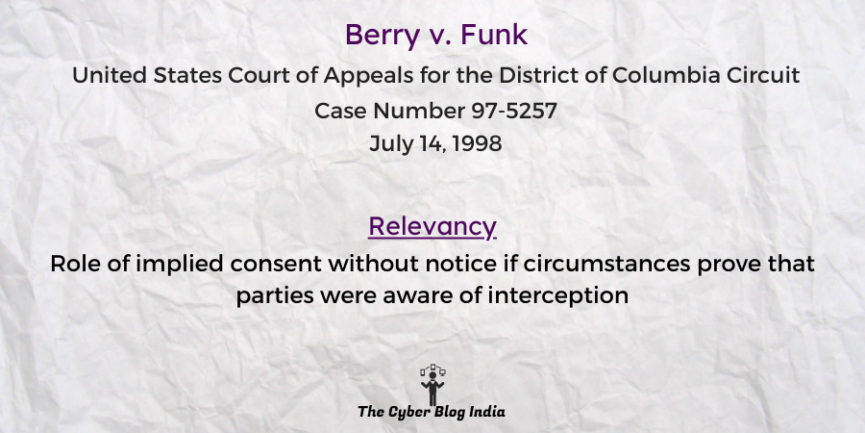Berry v. Funk

Berry v. Funk
146 F.3d 1003
In the United States Court of Appeals for the District of Columbia Circuit
Case Number 97-5257
Before Circuit Judge Silberman, Circuit Judge Williams and Circuit Judge Tatel
Decided on July 14, 1998
Relevancy of the case: Role of implied consent without notice if circumstances prove that parties were aware of interception
Statutes and Provisions Involved
- The Federal Wiretapping Act, 18 USC §§ 2510-2521
- Civil Action for Deprivation of Rights, 42 USC § 1983
Relevant Facts of the Case
- The appellant was the Acting Assistant Secretary of State Legislative Affairs. He complained that government officials monitored and intercepted his telephone conversations with former Assistant Secretary of State for Consular Affairs, Ms Tamposi.
- The appellant was a part of Ex-President William Clinton’s passport probe before the 1992 elections. While on duty, he had multiple telephone calls with Ms Tamposi through the State Department’s Operations Center (OC). They spoke about the possibility that the said passport was tampered with.
- The OC’s guidelines stated that telephone calls should not be monitored unless requested.
- Further, an officer from the OC broadcasted one of the conversations between the appellant and Ms. Tamposi in the OC.
- The Inspector General’s Office started an investigation into the misconduct of the OC’s employees in monitoring the calls.
- The OC employees were informed that monitoring the impugned calls might be a violation and promptly issued new guidelines.
- The appellant then filed a civil suit, and the District Court gave a summary judgment to the government defendants (present appellees).
Prominent Arguments by the Counsels
- The appellant’s counsel made three arguments. Firstly, the parties must receive actual notice before monitoring each call. Secondly, neither the appellant nor Ms Tamposi consented to the monitoring. Third, intercepting the call constituted ‘search and seizure,’ violating the Fourth Amendment.
- The appellees’ counsel submitted that the claims were time-barred. Further, he submitted that their activities fall under the exceptions of the Federal Wiretapping Statute. The appellee’s counsel also contended that monitoring and intercepting the calls was in ordinary business and that the appellant should have known that. Lastly, he submitted that a law enforcement officer can use the intercepted evidence during an investigation if they are unaware of how it was procured. All the appellees can claim qualified immunity.
Opinion of the Bench
- The trial court erroneously granted a summary judgment for the defendants before allowing the appellant to present his evidence.
- Circumstances surrounding the conversations did not suggest that Tamposi and Berry knew they were monitored. However, this would not constitute a violation of the Fourth Amendment rights.
- The OC’s guidelines explicitly mention that telephonic calls should not be monitored unless requested.
Final Decision
- The court allowed the appeal and remanded for further proceedings.
Nikita D’Lima, an undergraduate student at NMIMS School of Law, Navi Mumbai, prepared this case summary during her internship with The Cyber Blog India in May/June 2023.
